人教版新目标八年级下册-英语语法知识点精讲练习
人教版新目标英语八年级下册:Unit 9《Have you ever been to museum》 讲解+练习题目+答案
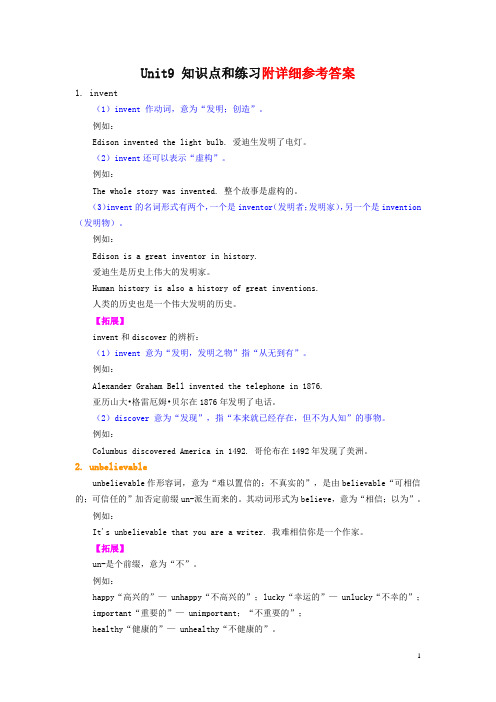
Unit9 知识点和练习附详细参考答案1. invent(1)invent 作动词,意为“发明;创造”。
例如:Edison invented the light bulb. 爱迪生发明了电灯。
(2)invent还可以表示“虚构”。
例如:The whole story was invented. 整个故事是虚构的。
(3)invent的名词形式有两个,一个是inventor(发明者;发明家),另一个是invention (发明物)。
例如:Edison is a great inventor in history.爱迪生是历史上伟大的发明家。
Human history is also a history of great inventions.人类的历史也是一个伟大发明的历史。
【拓展】invent和discover的辨析:(1)invent 意为“发明,发明之物”指“从无到有”。
例如:Alexander Graham Bell invented the telephone in 1876.亚历山大•格雷厄姆•贝尔在1876年发明了电话。
(2)discover 意为“发现”,指“本来就已经存在,但不为人知”的事物。
例如:Columbus discovered America in 1492. 哥伦布在1492年发现了美洲。
2. unbelievableunbelievable作形容词,意为“难以置信的;不真实的”,是由believable“可相信的;可信任的”加否定前缀un-派生而来的。
其动词形式为believe,意为“相信;以为”。
例如:It's unbelievable that you are a writer. 我难相信你是一个作家。
【拓展】un-是个前缀,意为“不”。
例如:happy“高兴的”— unhappy“不高兴的”;lucky“幸运的”— unlucky“不幸的”;important“重要的”— unimportant;“不重要的”;healthy“健康的”— unhealthy“不健康的”。
【人教新目标】八年级英语下册《Unit 3》短语及语法讲义
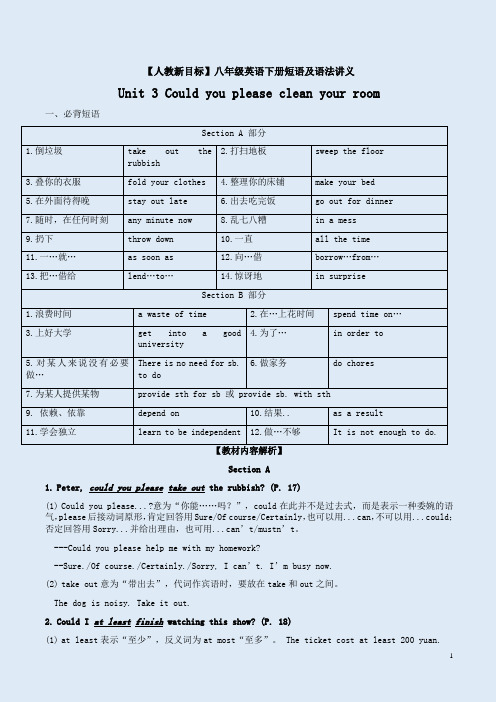
【人教新目标】八年级英语下册短语及语法讲义Unit 3 Could you please clean your room一、必背短语Section A 部分1.倒垃圾take out therubbish2.打扫地板sweep the floor3.叠你的衣服fold your clothes4.整理你的床铺make your bed5.在外面待得晚stay out late6.出去吃完饭go out for dinner7.随时,在任何时刻any minute now8.乱七八糟in a mess9.扔下throw down 10.一直all the time11.一…就…as soon as 12.向…借borrow…from…13.把…借给lend…to…14.惊讶地in surpriseSection B 部分1.浪费时间 a waste of time2.在…上花时间spend time on…3.上好大学get into a gooduniversity4.为了…in order to5.对某人来说没有必要做…There is no need for sb.to do6.做家务do chores7.为某人提供某物provide sth for sb 或 provide sb. with sth9. 依赖、依靠depend on 10.结果.. as a result11.学会独立learn to be independent 12.做…不够It is not enough to do.【教材内容解析】Section A1.Peter, could you please take out the rubbish? (P. 17)(1)Could you please...?意为“你能……吗?”,could在此并不是过去式,而是表示一种委婉的语气,please后接动词原形,肯定回答用Sure/Of course/Certainly,也可以用...can,不可以用...could;否定回答用Sorry...并给出理由,也可用...can’t/mustn’t。
(人教新目标)八年级英语(下)短语语法知识点汇总Unit9
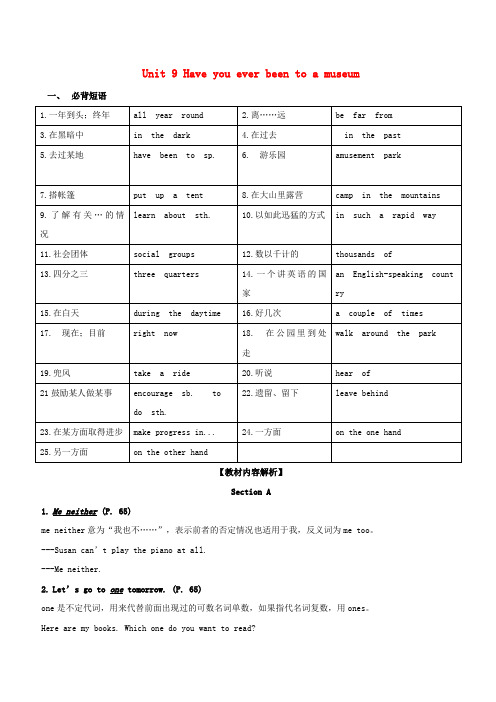
Unit 9 Have you ever been to a museum 一、必背短语【教材内容解析】Section A1.Me neither (P. 65)me neither意为“我也不……”,表示前者的否定情况也适用于我,反义词为me too。
---Susan can’t play the piano at all.---Me neither.2.Let’s go to one tomorrow. (P. 65)one是不定代词,用来代替前面出现过的可数名词单数,如果指代名词复数,用ones。
Here are my books. Which one do you want to read?---I don’t like these dresses.---How about those ones over there.3.Let’s go somewhere different today. (P. 65)somewhere用作副词,表示“在某处、到某处”,常用于肯定句中,在否定句和疑问句中用anywhere。
It’s cold here. Let’s go somewhere else.Did you go anywhere last Sunday?4.They are going to take the subway. (P. 66)take the subway意为“乘地铁”,take用作动词,可以表示“乘、坐(车、船等)”。
We take the subway to work every day.5.It’s a great way to spend a Saturday afternoon. (P. 66)(1) way表示“方法”时,后常接动词不定式或者of doing作定语。
Can you think out a way to open the door/of opening the door?(2) spend的用法① sb. spend+时间/金钱+on sth. “在某事上花费多长时间或者多少钱”The man spent the whole day on his speech.The family spent 10,000 dollars on their trip.② sb. spend+时间+(in) doing sth. “花费多长时间做某事”The boy has spent two hours playing the computer games.【拓展】辨析spend, pay, take和cost6.We put up a tent and cooked outside. (P. 66)put up意为“搭建”,还可以表示“举起、张贴”。
新目标人教版八年级下册第八单元语法现在完成时知识点解析
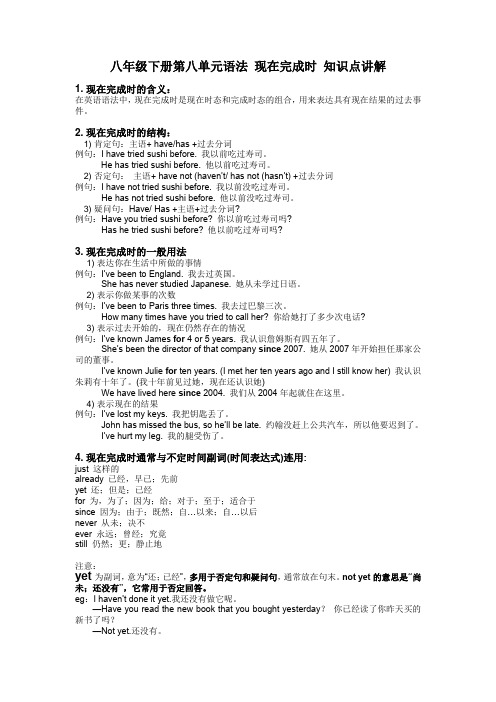
八年级下册第八单元语法现在完成时知识点讲解1. 现在完成时的含义:在英语语法中,现在完成时是现在时态和完成时态的组合,用来表达具有现在结果的过去事件。
2. 现在完成时的结构:1) 肯定句:主语+ have/has +过去分词例句:I have tried sushi before. 我以前吃过寿司。
He has tried sushi before. 他以前吃过寿司。
2) 否定句:主语+ have not (haven’t/ has not (hasn’t) +过去分词例句:I have not tried sushi before. 我以前没吃过寿司。
He has not tried sushi before. 他以前没吃过寿司。
3) 疑问句:Have/ Has +主语+过去分词?例句:Have you tried sushi before? 你以前吃过寿司吗?Has he tried sushi before? 他以前吃过寿司吗?3. 现在完成时的一般用法1) 表达你在生活中所做的事情例句:I’ve been to England. 我去过英国。
She has never studied Japanese. 她从未学过日语。
2) 表示你做某事的次数例句:I’ve been to Paris three times. 我去过巴黎三次。
How many times have you tried to call her? 你给她打了多少次电话?3) 表示过去开始的,现在仍然存在的情况例句:I’ve known James for 4 or 5 years. 我认识詹姆斯有四五年了。
She’s been the director of that company since 2007. 她从2007年开始担任那家公司的董事。
I’ve known Julie for ten years. (I met her ten years ago and I still know her) 我认识朱莉有十年了。
人教版新目标八年级下册-英语语法知识点精讲+练习
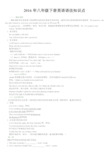
2016年八年级下册英语语法知识点(一)一般将来时一般将来时表示将来某个时间要发生的动作或者存在的状态。
通常与表示将来的时间状语连用,如tomorrow, the day after tomorrow, next year, next month, next week, in 100 years等。
be going to do (动词原形)结构:表示打算、准备做的事情或者肯定要发生的事情。
如:It is going to rain.will do 结构表示将来的用法:1. 表示预见Do you think it will rain?You will feel better after a good rest.2. 表示意图I will borrow a book from our school library tomorrow.What will she do tomorrow?基本构成如下:一般疑问句构成:(1)will+主语+do…? Will Sarah come to visit me next Sunday?(2)there be 结构的一般疑问句:Will there + be …?Will there be fewer trees? Yes, there will. / No, there won’t否定句构成:will + not (won’t)+doSarah won’t come to visit me next Sunday.特殊疑问句构成:特殊疑问词+will+主语+…?What will Sarah do next Sunday?(二)should的用法:should用来提出建议和忠告,后边加动词原形,否定句直接在should后边加not.例如:I think you should eat less junk food.我认为你应该少吃垃圾食品。
She drives a lot and she seldom walks. So I think she should walk a lot.她经常开车,很少走路。
人教新目标版英语八年级下册语法专练(含答案解析)

人教新目标版英语八年级下册语法专练学校:___________姓名:___________班级:___________考号:___________二、单项选择6.Zhao Lan________already________in this school for two years.A.was;studying B.will;study C.has;studied D.are;studying 7.They_____a football game from7to9last night.A.were watching B.watch C.watched D.are watching 8.The famous writer__________five new books since two years ago.A.is writing B.was writing C.wrote D.has written 9.—Our country______a lot so far.—Yes.I hope it will be even______.A.has changed;well B.changed;good C.has changed;better D.changed;better10.—I called you yesterday evening,but there was no answer.—Oh,I am sorry I________dinner at my friend’s home.A.have B.had C.was having D.have had 11.—Did you notice him come in?—No.I________a football game.A.have watched B.had watchedC.am watching D.was watching12.The Lion King is a very good film.I________it three times.A.will see B.have seen C.saw D.see 13.Schools_________allow students at least one hour a day for sports.14.________you tell me how to get to the post office?A.Must B.Need C.Could D.Should 15.—Could I borrow your book?—Of course,you_______.A.can B.must C.should D.will 16.—Could you please help me do my homework?—Sorry,I________.You________do it by yourself.A.could;may B.couldn’t;should C.can’t;should D.can’t;may 17.—I’m not good at physics.What shall I do?—You should work much________than before.A.hard B.harder C.hardest D.more hardly 18.The more you smile,the________you will feel.A.happy B.happier C.happily D.more happy 19.This book is________that one,but________than that one.A.as interesting as;expensive B.as more interesting as;more expensive C.as interesting as;more expensive D.as more interesting as;as expensive三、同义句转化四、单项选择23.Teresa is________nervous________she can’t talk in front of the class.A.such;that B.too;to C.so;that D.enough;to 24.The boy________to bed________his mother came back.A.went not;until B.didn’t go;after C.went;until D.didn’t go;until 25.You can't pass the exam________you study hard.A.to swim B.how to swim C.swimming D.how swim 39.________the project in time,the staff were working at weekends.A.Completing B.Having completed C.To complete D.To havecompleted40.With the rapid development of the world,we have something new________with all by ourselves every day.A.deal B.dealt C.to deal D.dealing 41.Last summer I took a lesson on________.A.how to make dresses B.how dresses be madeC.how to be made dresses D.how dresses to be made42.The house is not large enough________.A.to live in B.to be lived in C.for live D.for living 43.It’s foolish________so.A.for you to say B.of you to say C.with you saying D.in your saying参考答案:1.was doing【详解】句意:昨天晚上我回到家时,我父亲正在洗衣服。
初中英语人教新目标八年级下册 Unit 1 复习(主要短语+知识点讲解+单元语法)
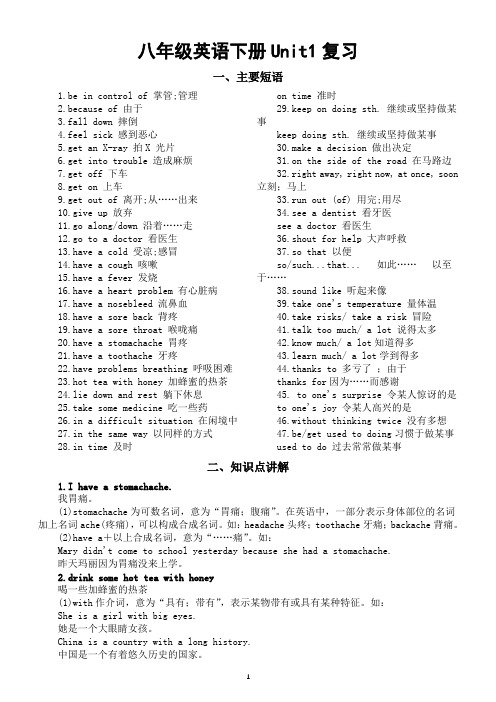
八年级英语下册Unit1复习一、主要短语1.be in control of 掌管;管理2.because of 由于3.fall down 摔倒4.feel sick 感到恶心5.get an X-ray 拍X 光片6.get into trouble 造成麻烦7.get off 下车8.get on 上车9.get out of 离开;从……出来10.give up 放弃11.go along/down 沿着……走12.go to a doctor 看医生13.have a cold 受凉;感冒14.have a cough 咳嗽15.have a fever 发烧16.have a heart problem 有心脏病17.have a nosebleed 流鼻血18.have a sore back 背疼19.have a sore throat 喉咙痛20.have a stomachache 胃疼21.have a toothache 牙疼22.have problems breathing 呼吸困难23.hot tea with honey 加蜂蜜的热茶24.lie down and rest 躺下休息25.take some medicine 吃一些药26.in a difficult situation 在闲境中27.in the same way 以同样的方式28.in time 及时on time 准时29.keep on doing sth. 继续或坚持做某事keep doing sth. 继续或坚持做某事30.make a decision 做出决定31.on the side of the road 在马路边32.right away, right now, at once, soon 立刻;马上33.run out (of) 用完;用尽34.see a dentist 看牙医see a doctor 看医生36.shout for help 大声呼救37.so that 以便so/such...that... 如此……以至于……38.sound like 听起来像39.take one's temperature 量体温40.take risks/ take a risk 冒险41.talk too much/ a lot 说得太多42.know much/ a lot知道得多43.learn much/ a lot学到得多44.thanks to 多亏了;由于thanks for因为……而感谢45. to one's surprise 令某人惊讶的是to one's joy 令某人高兴的是46.without thinking twice 没有多想47.be/get used to doing习惯于做某事used to do 过去常常做某事二、知识点讲解1.I have a stomachache.我胃痛。
初中英语人教新目标八年级下册Unit 3 SectionA预习指导(知识点+练习题)
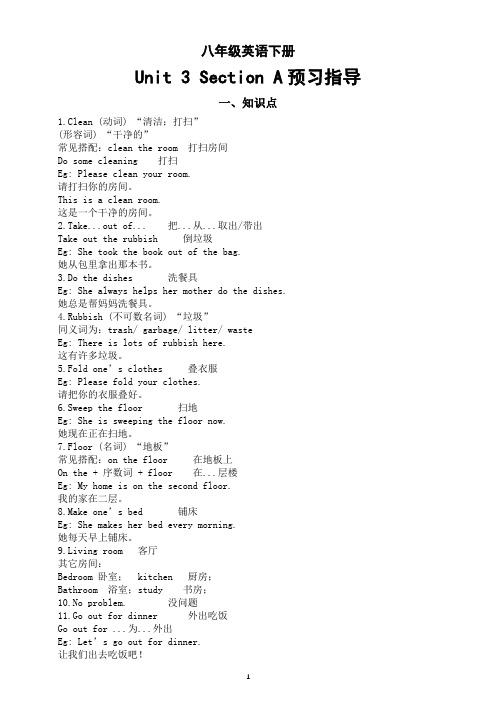
八年级英语下册Unit 3 Section A预习指导一、知识点1.Clean (动词) “清洁;打扫”(形容词) “干净的”常见搭配:clean the room 打扫房间Do some cleaning 打扫Eg: Please clean your room.请打扫你的房间。
This is a clean room.这是一个干净的房间。
2.Take...out of... 把...从...取出/带出Take out the rubbish 倒垃圾Eg: She took the book out of the bag.她从包里拿出那本书。
3.Do the dishes 洗餐具Eg: She always helps her mother do the dishes.她总是帮妈妈洗餐具。
4.Rubbish (不可数名词) “垃圾”同义词为:trash/ garbage/ litter/ wasteEg: There is lots of rubbish here.这有许多垃圾。
5.Fold one’s clothes 叠衣服Eg: Please fold your clothes.请把你的衣服叠好。
6.Sweep the floor 扫地Eg: She is sweeping the floor now.她现在正在扫地。
7.Floor (名词) “地板”常见搭配:on the floor 在地板上On the + 序数词 + floor 在...层楼Eg: My home is on the second floor.我的家在二层。
8.Make one’s bed 铺床Eg: She makes her bed every morning.她每天早上铺床。
9.Living room 客厅其它房间:Bedroom 卧室; kitchen 厨房;Bathroom 浴室;study 书房;10.No problem. 没问题11.Go out for dinner 外出吃饭Go out for ...为...外出Eg: Let’s go out for dinner.让我们出去吃饭吧!12.Go to the movies 去看电影类似词组:see the film 看电影Eg: They went to the movies last night.他们昨晚去看电影了。
人教新目标八年级英语下册Unit 6 An old man tried to move the mountains知识点总结和同步习题
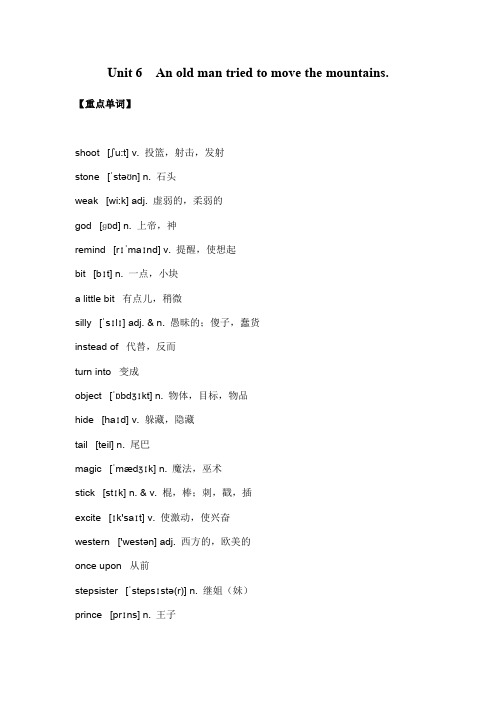
Unit 6 An old man tried to move the mountains.【重点单词】shoot [ʃu:t] v. 投篮,射击,发射stone [ˈstəʊn] n. 石头weak [wi:k] adj. 虚弱的,柔弱的god [ɡɒd] n. 上帝,神remind [rɪˈmaɪnd] v. 提醒,使想起bit [bɪt] n. 一点,小块a little bit 有点儿,稍微silly [ˈsɪlɪ] adj. & n. 愚昧的;傻子,蠢货instead of 代替,反而turn into 变成object [ˈɒbdʒɪkt] n. 物体,目标,物品hide [haɪd] v. 躲藏,隐藏tail [teil] n. 尾巴magic [ˈmædʒɪk] n. 魔法,巫术stick [stɪk] n. & v. 棍,棒;刺,戳,插excite [ɪk'saɪt] v. 使激动,使兴奋western ['westən] adj. 西方的,欧美的once upon 从前stepsister [ˈstepsɪstə(r)] n. 继姐(妹)prince [prɪns] n. 王子fall in love 爱上,喜欢上fit [fɪt] v. 适合,合身couple ['kʌpl] n. (尤指)夫妻,两人smile [smaɪl] n.& v. 微笑marry [ˈmæri] v. 与某人结婚get married 结婚gold [ɡəʊld] n. 黄金,金币emperor [ˈempərə] n. 皇帝silk [sɪlk] n. 丝绸underwear [ˈʌndəwɛə] n. 内衣nobody [ˈnəʊbədi] pron. 无人,没有任何人,谁也不stupid ['stju:pɪd] adj. & n. 愚蠢的,傻的;傻子cheat [tʃi:t] v. 欺骗,愚弄stepmother [ˈstepmʌðə(r)] n. 继母wife [waɪf] n. 妻子husband [ˈhʌzbənd] n. 丈夫whole [həul] adj. 全部的,整体的scene [si:n] n. 舞台,(戏剧)场景moonlight ['mu:nlaɪt] n. 月光shine [ʃaɪn] v. 照耀,发光bright [braɪt] adj. & adv. 明亮的,发亮的;明亮地ground [graʊnd] n. 地面lead [li:d] n. & v. 领导,主角;带路voice [vɔis] n. 嗓音brave [breiv] adj. 勇敢的【重点短语】1. work on doing sth. 致力于做某事2. as soon as ... 一……就…....3. once upon a time 从前4. continue to do sth. 继续做某事5. make sth. happen 使某事发生6.try to do sth. 努力做某事7. the journey to sp. ......之旅8. tell the/a story 讲故事9. put on 穿10. a little bit 有点儿11. keep doing sth. 坚持做某事12. give up 放弃13. instead of 代替;反而14. turn...into... 使......变成......15. get married 结婚16. the main character 主要人物;主人公17. at other times 在另外一些时候18. be able to 能;会19. come out (书、电影等)出版20. become interested in... 对……感兴趣21. walk to the other side 走到另一边去22. a fairy tale 一个神话故事23. the rest of the story 故事的其余部分24. leave sb. to do sth. 让某人做某事25. make a plan to do sth. 筹划/计划做某事26. go to sleep 去睡觉27. lead sb. to sp. 把某人领到某地28. get lost 迷路29. change one’s plan 改变计划30. tell sb. to do sth. 叫某人做某事31. in the moonlight 在月光下32. find one’ s way home 找到某人回家的路33. the next day 第二天34. send sb. to sp. 派某人去某地35. so...that... 如此.......以致于.......【重点句型】1.So what do you think about the story of Yu Gong? 你觉得愚公的故事怎么样?2. It doesn't seem very possible to move a mountain. 把一座山给移掉好像不太可能。
新目标人教版八年级英语下全册重点及练习
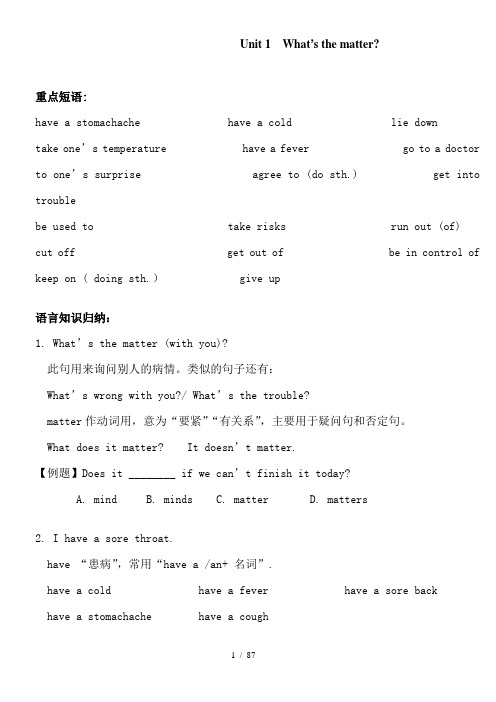
Unit 1 What’s the matter?重点短语:have a stomachache have a cold lie downtake one’s temperature have a fever go to a doctor to one’s surprise agree to (do sth.) get into troublebe used to take risks run out (of)cut off get out of be in control of keep on ( doing sth.) give up语言知识归纳:1. What’s the matter (with you)?此句用来询问别人的病情。
类似的句子还有:What’s wrong with you?/ What’s the trouble?matter作动词用,意为“要紧”“有关系”,主要用于疑问句和否定句。
What does it matter? It doesn’t matter.【例题】Does it ________ if we can’t finish it today?A. mindB. mindsC. matterD. matters2. I have a sore throat.have “患病”,常用“have a /an+ 名词”.have a cold have a fever have a sore back have a stomachache have a cough【例题】( )---Does he often have ______ cold? ---Yes. He also _____a cough and a sore throat.A. a; hasB. /; hasC. a; haveD. /; have3.Lie down and rest! 躺下休息lie down 躺下4.That’s probably why. 那可能就是原因。
新目标英语八年级下unit_4重点短语句型语法+配套试题(答案)
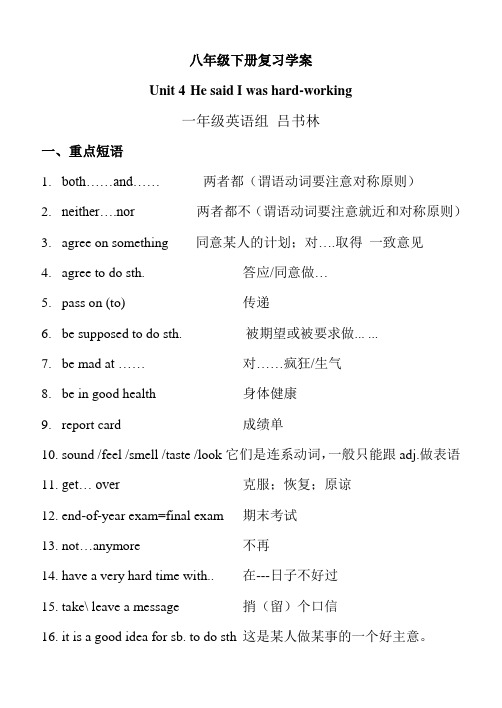
八年级下册复习学案Unit 4 He said I was hard-working一年级英语组吕书林一、重点短语1.both……and……两者都(谓语动词要注意对称原则)2.neither….nor 两者都不(谓语动词要注意就近和对称原则)3.agree on something 同意某人的计划;对….取得一致意见4.agree to do sth. 答应/同意做…5.pass on (to) 传递6.be supposed to do sth. 被期望或被要求做... ...7.be mad a t ……对……疯狂/生气8.be in good health 身体健康9.report card 成绩单10.sound /feel /smell /taste /look它们是连系动词,一般只能跟adj.做表语11.get… over 克服;恢复;原谅12.end-of-year exam=final exam 期末考试13.not…anymore 不再14.have a very hard time with.. 在---日子不好过15.take\ leave a message 捎(留)个口信16.it is a good idea for sb. to do sth 这是某人做某事的一个好主意。
17.there is no difference between…and..在…和…之间没有区别18.the Hope Project 希望工程本单元目标句型:1.转述他人话语:What did sb. say? He said I …She said she…They said…许老师告诉我徐梦蝶会说二种语言。
Mr. Xu told me that XuMengdie could speak three languages.许老师说地球绕着太阳转。
Mr. Xu said (that)the earth turns around the sun. 许老师告诉我他将去北京。
初中英语人教新目标八年级下册Unit 2 Section A预习指导(知识点+练习题)
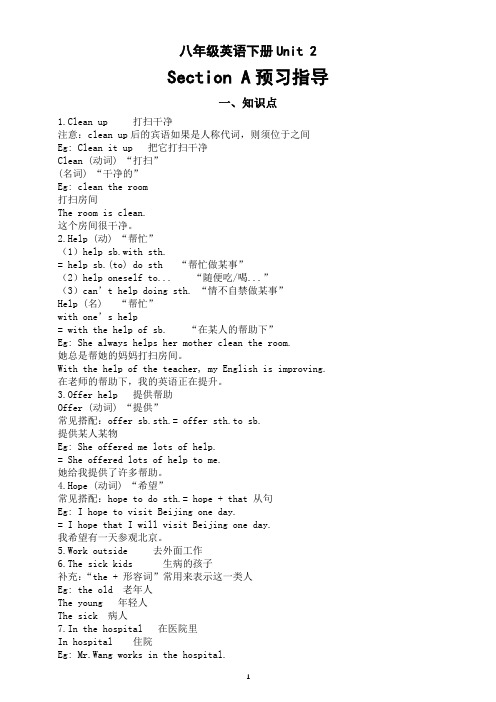
八年级英语下册Unit 2Section A预习指导一、知识点1.Clean up 打扫干净注意:clean up后的宾语如果是人称代词,则须位于之间Eg: Clean it up 把它打扫干净Clean (动词) “打扫”(名词) “干净的”Eg: clean the room打扫房间The room is clean.这个房间很干净。
2.Help (动) “帮忙”(1)help sb.with sth.= help sb.(to) do sth “帮忙做某事”(2)help oneself to... “随便吃/喝...”(3)can’t help doing sth. “情不自禁做某事”Help (名) “帮忙”with one’s help= with the help of sb. “在某人的帮助下”Eg: She always helps her mother clean the room.她总是帮她的妈妈打扫房间。
With the help of the teacher, my English is improving. 在老师的帮助下,我的英语正在提升。
3.Offer help 提供帮助Offer (动词) “提供”常见搭配:offer sb.sth.= offer sth.to sb.提供某人某物Eg: She offered me lots of help.= She offered lots of help to me.她给我提供了许多帮助。
4.Hope (动词) “希望”常见搭配:hope to do sth.= hope + that 从句Eg: I hope to visit Beijing one day.= I hope that I will visit Beijing one day.我希望有一天参观北京。
5.Work outside 去外面工作6.The sick kids 生病的孩子补充:“the + 形容词”常用来表示这一类人Eg: the old 老年人The young 年轻人The sick 病人7.In the hospital 在医院里In hospital 住院Eg: Mr.Wang works in the hospital.王先生在这所医院工作。
初中英语 人教版新目标 八年级下册Unit5复习(词汇,句型,语法等练习)
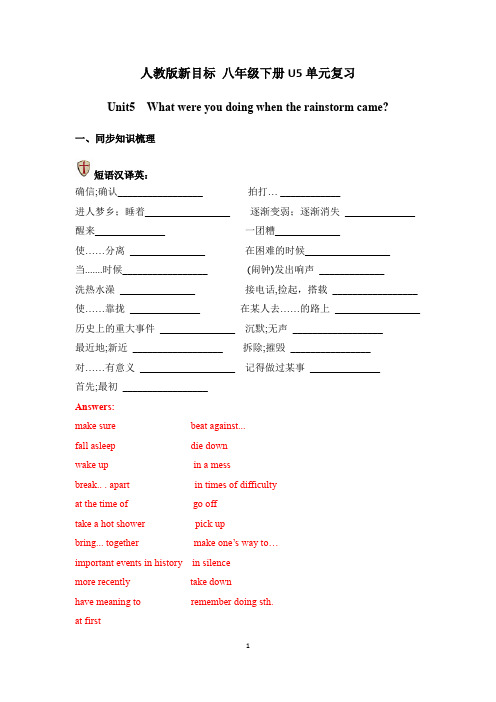
人教版新目标八年级下册U5单元复习Unit5 What were you doing when the rainstorm came?一、同步知识梳理短语汉译英:确信;确认_________________ 拍打… ____________进人梦乡;睡着_________________ 逐渐变弱;逐渐消失______________ 醒来______________ 一团糟_____________使……分离_______________ 在困难的时候_________________ 当.......时候_________________ (闹钟)发出响声_____________洗热水澡_______________ 接电话,捡起,搭载_________________使……靠拢______________ 在某人去……的路上_________________历史上的重大事件_______________ 沉默;无声__________________最近地;新近__________________ 拆除;摧毁________________对……有意义___________________ 记得做过某事______________首先;最初_________________Answers:make sure beat against...fall asleep die downwake up in a messbreak.. . apart in times of difficultyat the time of go offtake a hot shower pick upbring... together make one’s way to…important events in history in silencemore recently take downhave meaning to remember doing sth.at first重点句型与语法翻译句子:(1)我8点又给你打电话了,但你也没有回答。
2020年春人教新目标英语八年级下册unit1重点知识点分析与练习(无答案)
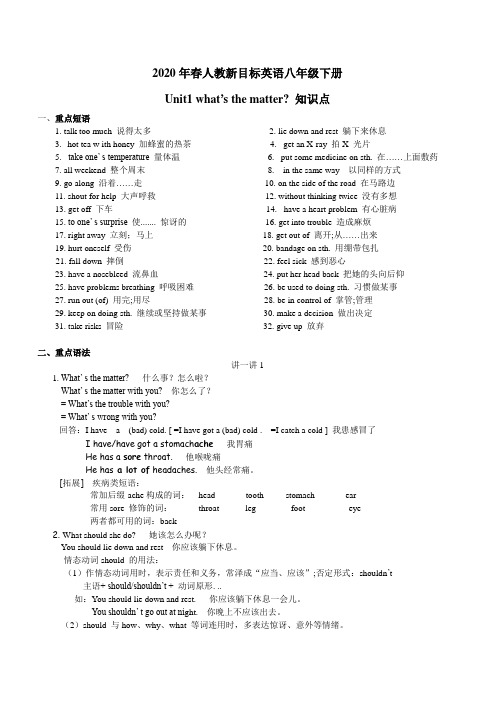
2020年春人教新目标英语八年级下册Unit1 what’s the matter? 知识点一、重点短语1. talk too much 说得太多2. lie down and rest 躺下来休息3.hot tea w ith honey 加蜂蜜的热茶4.get an X-ray 拍X 光片5.take one’ s temperature 量体温6.put some medicine on sth. 在……上面敷药7. all weekend 整个周末8. in the same way 以同样的方式9. go along 沿着……走10. on the side of the road 在马路边11. shout for help 大声呼救12. without thinking twice 没有多想13. get off 下车14.have a heart problem 有心脏病15.to one’ s surprise 使....... 惊讶的16. get into trouble 造成麻烦17. right away 立刻;马上18. get out of 离开;从……出来19. hurt oneself 受伤20. bandage on sth. 用绷带包扎21. fall down 摔倒22. feel sick 感到恶心23. have a nosebleed 流鼻血24. put her head back 把她的头向后仰25. have problems breathing 呼吸困难26. be used to doing sth. 习惯做某事27. run out (of) 用完;用尽28. be in control of 掌管;管理29. keep on doing sth. 继续或坚持做某事30. make a decision 做出决定31. take risks 冒险32. give up 放弃二、重点语法讲一讲11. What’ s the matter? 什么事?怎么啦?What’ s the matter with you?你怎么了?= What’s the trouble with you?= What’ s wrong with you?回答:I have a (bad) cold. [ =I have got a (bad) cold . =I catch a cold ] 我患感冒了I have/have got a stomach ache 我胃痛He has a sore throat. 他喉咙痛He has a lot of headaches. 他头经常痛。
初中英语人教新目标八年级下册Unit4Grammar预习指导(知识点+练习题)
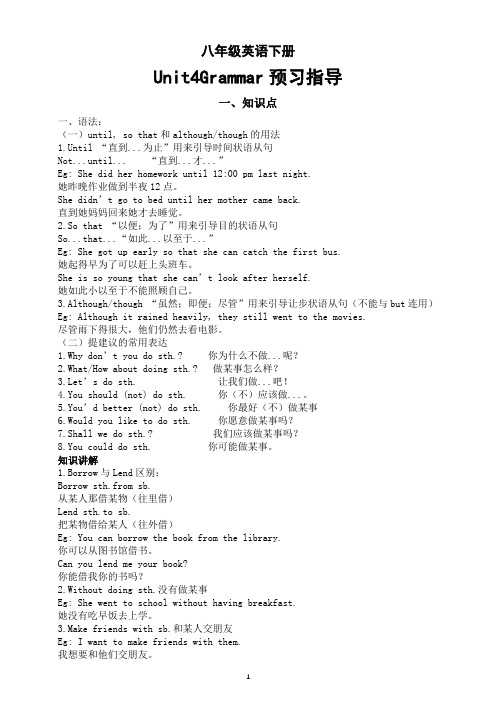
八年级英语下册Unit4Grammar预习指导一、知识点一、语法:(一)until, so that和although/though的用法1.Until “直到...为止”用来引导时间状语从句Not...until... “直到...才...”Eg: She did her homework until 12:00 pm last night.她昨晚作业做到半夜12点。
She didn’t go to bed until her mother came back.直到她妈妈回来她才去睡觉。
2.So that “以便;为了”用来引导目的状语从句So...that...“如此...以至于...”Eg: She got up early so that she can catch the first bus.她起得早为了可以赶上头班车。
She is so young that she can’t look after herself.她如此小以至于不能照顾自己。
3.Although/though “虽然;即便;尽管”用来引导让步状语从句(不能与but连用)Eg: Although it rained heavily, they still went to the movies.尽管雨下得很大,他们仍然去看电影。
(二)提建议的常用表达1.Why don’t you do sth.? 你为什么不做...呢?2.What/How about doing sth.? 做某事怎么样?3.Let’s do sth. 让我们做...吧!4.You should (not) do sth. 你(不)应该做...。
5.You’d better (not) do sth. 你最好(不)做某事6.Would you like to do sth. 你愿意做某事吗?7.Shall we do sth.? 我们应该做某事吗?8.You could do sth. 你可能做某事。
初中英语人教新目标八年级下册Unit 1Grammar写作预习指导(知识点+练习题)
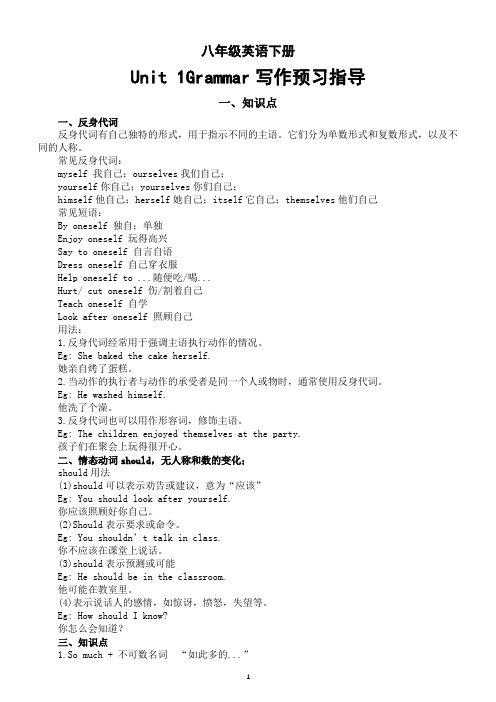
八年级英语下册Unit 1Grammar写作预习指导一、知识点一、反身代词反身代词有自己独特的形式,用于指示不同的主语。
它们分为单数形式和复数形式,以及不同的人称。
常见反身代词:myself 我自己;ourselves我们自己;yourself你自己;yourselves你们自己;himself他自己;herself她自己;itself它自己;themselves他们自己常见短语:By oneself 独自;单独Enjoy oneself 玩得高兴Say to oneself 自言自语Dress oneself 自己穿衣服Help oneself to ...随便吃/喝...Hurt/ cut oneself 伤/割着自己Teach oneself 自学Look after oneself 照顾自己用法:1.反身代词经常用于强调主语执行动作的情况。
Eg: She baked the cake herself.她亲自烤了蛋糕。
2.当动作的执行者与动作的承受者是同一个人或物时,通常使用反身代词。
Eg: He washed himself.他洗了个澡。
3.反身代词也可以用作形容词,修饰主语。
Eg: The children enjoyed themselves at the party.孩子们在聚会上玩得很开心。
二、情态动词should,无人称和数的变化;should用法(1)should可以表示劝告或建议,意为“应该”Eg: You should look after yourself.你应该照顾好你自己。
(2)Should表示要求或命令。
Eg: You shouldn’t talk in class.你不应该在课堂上说话。
(3)should表示预测或可能Eg: He should be in the classroom.他可能在教室里。
(4)表示说话人的感情,如惊讶,愤怒,失望等。
Eg: How should I know?你怎么会知道?三、知识点1.So much + 不可数名词“如此多的...”So many + 可数名词复数“如此多的...”Eg: There is so much water in the pool.这个池塘里有如此多的水。
人教版八年级下册各单元英语语法解析知识重点总结
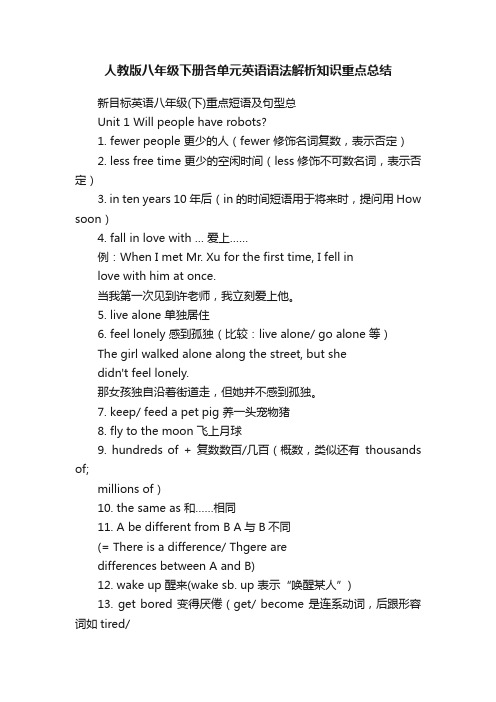
人教版八年级下册各单元英语语法解析知识重点总结新目标英语八年级(下)重点短语及句型总Unit 1 Will people have robots?1. fewer people 更少的人(fewer 修饰名词复数,表示否定)2. less free time 更少的空闲时间(less 修饰不可数名词,表示否定)3. in ten years 10年后(in 的时间短语用于将来时,提问用How soon)4. fall in love with … 爱上……例:When I met Mr. Xu for the first time, I fell inlove with him at once.当我第一次见到许老师,我立刻爱上他。
5. live alone 单独居住6. feel lonely 感到孤独(比较:live alone/ go alone 等)The girl walked alone along the street, but shedidn't feel lonely.那女孩独自沿着街道走,但她并不感到孤独。
7. keep/ feed a pet pig 养一头宠物猪8. fly to the moon 飞上月球9. hundreds of + 复数数百/几百(概数,类似还有thousands of;millions of)10. the same as 和……相同11. A be different from B A与B不同(= There is a difference/ Thgere aredifferences between A and B)12. wake up 醒来(wake sb. up 表示“唤醒某人”)13. get bored 变得厌倦(get/ become 是连系动词,后跟形容词如tired/angry/ excited 等)14. go skating 去滑冰(类似还有go hiking/ fishing /skating/ bike riding 等)15. lots of/ a lot of 许多(修饰可数名词、不可数名词都可以)16. at the weekends 在周末17. study at home on computers 在家通过电脑学习18. agree with sb. 同意某人(的意见)19. I don't agree. = I disagree. 我不同意。
新目标人教版八年级下Unit 6 An old man tried to move the mountains课件及练习题
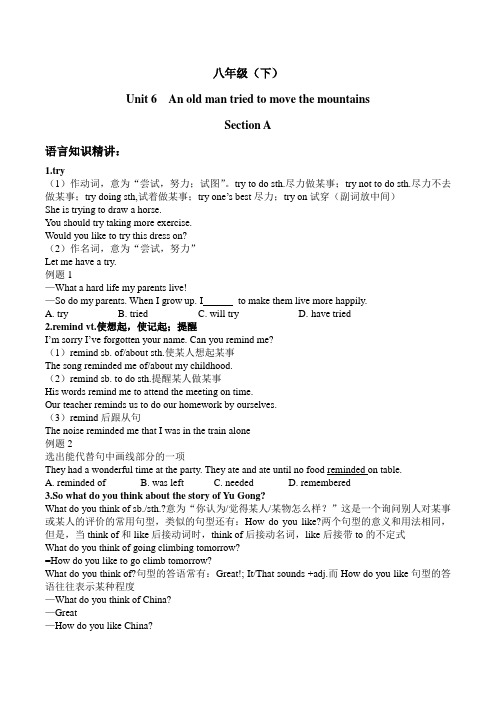
八年级(下)Unit 6 An old man tried to move the mountainsSection A语言知识精讲:1.try(1)作动词,意为“尝试,努力;试图”。
try to do sth.尽力做某事;try not to do sth.尽力不去做某事;try doing sth,试着做某事;try one’s best尽力;try on试穿(副词放中间)She is trying to draw a horse.You should try taking more exercise.Would you like to try this dress on?(2)作名词,意为“尝试,努力”Let me have a try.例题1—What a hard life my parents live!—So do my parents. When I grow up. I to make them live more happily.A. tryB. triedC. will tryD. have tried2.remind vt.使想起,使记起;提醒I’m sorry I’ve forgotten your name. Can you remind me?(1)remind sb. of/about sth.使某人想起某事The song reminded me of/about my childhood.(2)remind sb. to do sth.提醒某人做某事His words remind me to attend the meeting on time.Our teacher reminds us to do our homework by ourselves.(3)remind后跟从句The noise reminded me that I was in the train alone例题2选出能代替句中画线部分的一项They had a wonderful time at the party. They ate and ate until no food reminded on table.A. reminded ofB. was leftC. neededD. remembered3.So what do you think about the story of Yu Gong?What do you think of sb./sth.?意为“你认为/觉得某人/某物怎么样?”这是一个询问别人对某事或某人的评价的常用句型,类似的句型还有:How do you like?两个句型的意义和用法相同,但是,当think of和like后接动词时,think of后接动名词,like后接带to的不定式What do you think of going climbing tomorrow?=How do you like to go climb tomorrow?What do you think of?句型的答语常有:Great!; It/That sounds +adj.而How do you like句型的答语往往表示某种程度—What do you think of China?—Great—How do you like China?—I like it very much.例题3—do you think of the football match?—It’s perfect. It’s more exciting than match that I have ever watched.A. How; any otherB. How; any othersC. What; any otherD. What; any others4.solve v.解答;解决Will you help me to solve this puzzle?At last, they solved this problem successfully.【拓展】solution n.解答The solution to the questions are at the back of the book.例题4Our math teacher asks us to (解决)the problem with the knowledge we’ve learned5.neither of you is wrongneither pron. & adj.两者都不;adv. & conj.也不(1)neither作代词时,表示“两者都不,两者中任何一个都不”。
初中英语人教新目标八年级下册Unit 6 Grammar写作指导2(知识点+练习题)
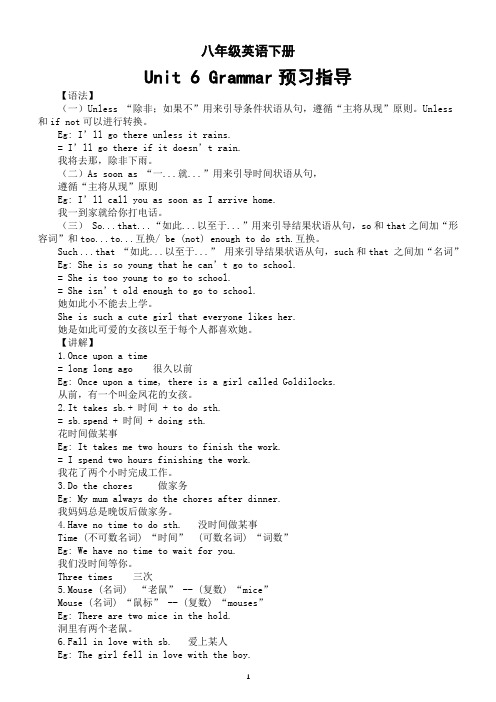
八年级英语下册Unit 6 Grammar预习指导【语法】(一)Unless “除非;如果不”用来引导条件状语从句,遵循“主将从现”原则。
Unless 和if not可以进行转换。
Eg: I’ll go there unless it rains.= I’ll go there if it doesn’t rain.我将去那,除非下雨。
(二)As soon as “一...就...”用来引导时间状语从句,遵循“主将从现”原则Eg: I’ll call you as soon as I ar rive home.我一到家就给你打电话。
(三) So...that...“如此...以至于...”用来引导结果状语从句,so和that之间加“形容词”和too...to...互换/ be (not) enough to do sth.互换。
Such ...that “如此...以至于...”用来引导结果状语从句,such和that 之间加“名词”Eg: She is so young that he can’t go to school.= She is too young to go to school.= She isn’t old enough to go to school.她如此小不能去上学。
She is such a cute girl that everyone likes her.她是如此可爱的女孩以至于每个人都喜欢她。
【讲解】1.Once upon a time= long long ago 很久以前Eg: Once upon a time, there is a girl called Goldilocks.从前,有一个叫金凤花的女孩。
2.It takes sb.+ 时间 + to do sth.= sb.spend + 时间 + doing sth.花时间做某事Eg: It takes me two hours to finish the work.= I spend two hours finishing the work.我花了两个小时完成工作。
- 1、下载文档前请自行甄别文档内容的完整性,平台不提供额外的编辑、内容补充、找答案等附加服务。
- 2、"仅部分预览"的文档,不可在线预览部分如存在完整性等问题,可反馈申请退款(可完整预览的文档不适用该条件!)。
- 3、如文档侵犯您的权益,请联系客服反馈,我们会尽快为您处理(人工客服工作时间:9:00-18:30)。
新目标八年级下册英语语法知识点精讲+练习(一)一般将来时一般将来时表示将来某个时间要发生的动作或者存在的状态。
通常与表示将来的时间状语连用,如tomorrow, the day after tomorrow, next year, next month, next week, in 100 years等。
be going to do(动词原形)结构:表示打算、准备做的事情或者肯定要发生的事情。
如:It is going to rain.will do结构表示将来的用法:1. 表示预见Do you think it will rain?You will feel better after a good rest.2. 表示意图I will borrow a book from our school library tomorrow.What will she do tomorrow?基本构成如下:一般疑问句构成:(1)will+主语+do…? Will Sarah come to visit me next Sunday?(2)there be 结构的一般疑问句:Will there + be …?Will there be fewer trees? Yes, there will. / No, there won’t否定句构成:will + not (won’t)+doSarah won’t come to visit me next Sunday.特殊疑问句构成:特殊疑问词+will+主语+…?What will Sarah do next Sunday?★★练一练★★根据例句,用will改写下列各句例:I don’t feel well today. (be better tomorrow)I’ll be better tomorrow.1. Gina has six classes today. (have a lot of homework tonight)_____________________________2. I’m tired now. (sleep later)_____________________________3. My parents need a new car. (buy one soon)_____________________________4. We can’t leave right now. (leave a little later)_____________________________5. The weather is awful today. (be better tomorrow)_____________________________答案:1. She’ll have a lot of homework tonight.2. I’ll sleep later.3. They’ll buy one soon.4. We’ll leave a little later.5. Maybe it’ll be better tomorrow.(二)should的用法:should用来提出建议和忠告,后边加动词原形,否定句直接在should后边加not.例如:I think you should eat less junk food.我认为你应该少吃垃圾食品。
She drives a lot and she seldom walks. So I think she should walk a lot.她经常开车,很少走路。
所以我认为她应该多走路。
Students shouldn’t spend too much time playing computer games.学生们不应当花太多的时间玩计算机游戏。
学习向别人提建议的几种句式:(1)I think you should…(2)Well, you could…(3)Maybe you should …(4)Why don’t you…?(5)What about doing sth.?(6)You’d better do sth.★★练一练★★用should或shouldn’t填空1. I can’t sleep the nig ht before exams.You ______ take a warm shower before you go to bed.2. Good friends ______ argue each other.3. There is little milk in the glass. We _______ buy some.4. They didn’t invite you? Maybe you ______ be friendlier.5. I am a little bit overweight. So I think I _______ do exercises every day.答案:1. should 2. shouldn’t 3. should 4. should 5. should(三)过去进行时过去进行时表示过去某一点时间正在进行的动作或者过去某一段时间内一直进行的动作。
1. 构成was /were + doing,例如:I was watching TV at 9 o’clock last night.at 9 o’clock last night是时间点They were playing football all afternoon.all afternoon是时间段2. 过去进行时的标志词at 8 o’clock last night, this time yesterday等。
例如:I was having lunch at home this time yesterday.昨天的这个时候我正在吃午饭。
At that time she was writing a book.那阵子她在写一本书。
(表示她在那段时间里一直在做那件事情。
)★★练一练★★用括号中所给动词的适当形式填空。
1. This time yesterday I ____ ______(read)books.2. At 9 o’clock last Sunday they ______ ______(have)a party.3. When I _____(come)into the classroom, she ________ ______(read)a storybook.4. She _____ ______(play)computer games while her mother ____ ______(cook)yesterday afternoon.5. I _____ ______(have)a shower when you _______(call)me yesterday.答案:1. was reading 2. were having 3. came; was reading4. was playing; was cooking5. was having; called(四)间接引语形成步骤:(1)不要逗号,冒号,引号(2)要考虑到人称的变化(人称的变化与汉语是一致的)(3)要考虑时态的变化(4)要考虑时间状语、地点状语和语示代词的变化。
1.2.★★练一练★★用括号中所给动词的适当形式填空。
1. She said I _____(be)hard-working.2. Peter told me he _____(be)bored yesterday.3. She said she _____(go)swimming last Sunday.4. Bobby said he _____(may)call me later.5. Antonio told me he _____(read)a book then.答案:1. was 2. was 3. went 4. might 5. was reading 请转述他人说的话:1. I go to the beach every Saturday. (Tom)2. I can speak three languages. (Lucy)3. I will call you tomorrow. (Mike)4. I’m having a surprise party for Lana. (she)(五)if引导的条件状语从句结构:if+一般现在时,主语+将来时含义:如果……,将要……例如:If you ask him, he will help you.如果你请求他,他会帮助你。
If n eed be, we’ll work all night.如果需要,我们就干个通宵。
★★练一练★★根据中文提示,完成句子。
1. 如果你参加聚会,你将会过得很开心。
If you ________ the party, you __________.2. 如果明天下雨,我们将不去野餐。
If it __________ tomorrow, we ___________.3. 如果你经常听英文歌,你将会喜欢英语的。
If you often ________, you _________________.答案:1. If you go to the party, you will have a good time2. If it rains tomorrow, we won’t go to the picnic3. If you often listen to English songs, you’ll like English二. 完形填空特点及解题思路(一)题型分类与特点完形填空试题是在给出的一篇短文中有目的地拿掉若干个词,留下一些空格,要求考生借助短文保留的部分,从所给的短文整体出发,在正确理解短文意思的基础上,根据句子和句子间的内在联系、词的用法和习惯搭配等,用适当的词或词语填空,使补全后的短文意思通顺、前后连贯、结构完整。
这种题型测试的内容从形式上看是单词或短语的填空,但它必须注意到短文中上、下文意思连贯、词语搭配和语法结构正确,所以在空格上所填的词必须符合语义适用和语法正确两条原则,只考虑某一侧面都可能导致错误。
中考中完形填空试题的基本题型分两类:完形填空选择题和完形填空题。
1. 完形填空选择题:该题型的特点是将一篇短文中若干词语抽掉留下空格,对每一空格提供若干个选择项,要求考生通读短文后,在理解短文意思的基础上,运用所学的词汇、句型、语法等语言知识,从所提供的备选项中选出一个最佳答案,使短文内容完整正确。
